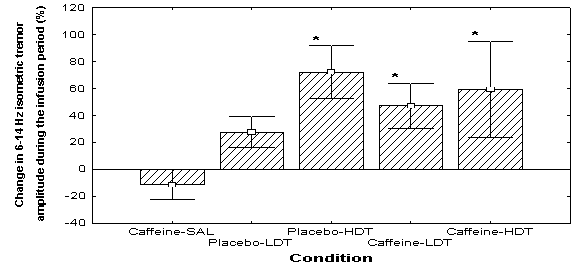| pA2 online © Copyright 2004 The British Pharmacological Society |
143P
University of Newcastle Winter Meeting December 2004 |
Caffeine, stress and tremor |
|
Caffeine is popularly supposed to cause tremor, but previous experiments have failed to find an association. The aim of the study was to investigate in a pilot study the ability of caffeine to cause tremor in the presence and absence of a chemical stressor.
The local ethics committee approved a randomized controlled trial involving seven subjects (three male), mean (SD) age 20.8 years (2.1) and weight 70.3 kg (12.8). Each subject made five separate visits in a semi-fasted state (minimum of 72 h between visits). Prior to each visit subjects abstained from caffeine for 48 h and alcohol for at least 24 h. Cannulae were placed into each antecubital fossa. The subject’s tremor was recorded isometrically using a 2 kg load cell. Subjects relaxed for 45 min before baseline measurements. Caffeine (7 mg kg-1) or placebo tablets were given followed 45 min later by an infusion of either saline (Sal) or 2 or 8 µg kg-1 h-1 terbutaline (LDT and HDT respectively) over a 45 min period. Measurements of isometric tremor were performed every 15 min during the investigation. Results were assessed by repeated-measures anova with the Bonferroni post hoc test.
In subjects ingesting caffeine alone no changes in tremor were recorded. With an infusion of terbutaline (2 µg kg-1) tremor amplitude increased by approximately 25% overall (P > 0.05). When the subject had ingested both caffeine and LDT, tremor increased significantly (P < 0.05) compared with both baseline and placebo-LDT. Similar results occurred with high dose terbutaline infusions. However, maximal effects were all similar (Figure 1).
Figure 1 Mean tremor size changes (± SEM) during the infusion period expressed as a percentage change from that obtained at 45 min (*P < 0.05)

Under certain conditions caffeine can increase tremor amplitude. The lack of effect of caffeine alone is probably due to tolerance via habituation of the adrenal medulla, as well as some β2-tolerance at the level of the muscle. This assertion is consistent with previous observations. Caffeine administered with low doses of terbutaline augmented the effects of tremor and may explain why stressed individuals claim caffeine causes tremor. The absence of additional effects of caffeine in association with a higher dose of the β2-agonist terbutaline suggests a ceiling-effect.
Lakie M, et al.Exp Physiol 1999; 84: 807.
Lakie M, et al. J Neurol Neurosurg Psychiatry 2004; 75: 1013.
Percept Mot Skills 1991; 72: 1175.